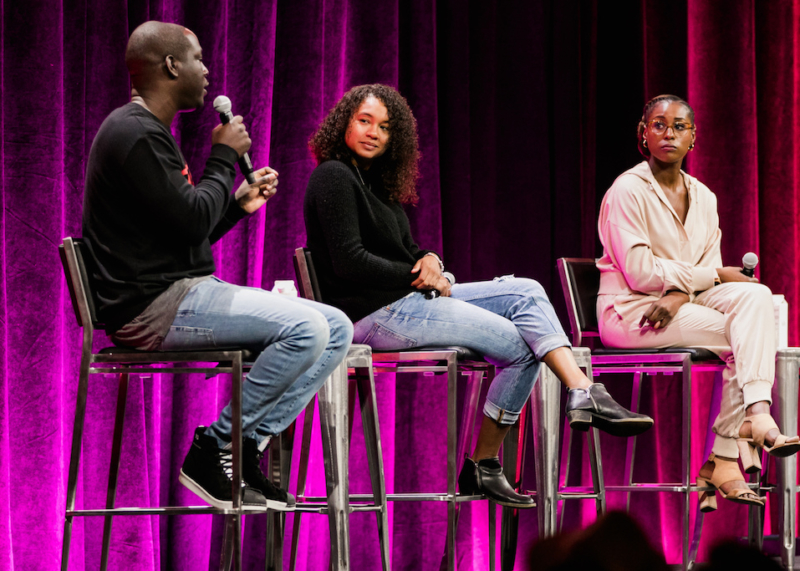Because she is the name and face of the operation, it’s easy to assume that Issa Rae alone is responsible for parlaying her web series, Awkward Black Girl, into a thriving business that includes producing her hit HBO show, Insecure, and other endeavors. But she would be the first to dispel such misconceptions.
“I like to hire people who have a specific lane, who do something very well,” Rae told WeWork employees from around the world as part of the “Team Awesome” track at the company’s Global Summit in Los Angeles in early January. “I hire a lot of people who are smarter than me. If I’m the smartest person in my company, then my company will go nowhere.”

Two of those people—Benoni Tagoe, business-development director of Issa Rae Productions, and Deniese Davis, her co-founder at ColorCreative, which shepherds underserved voices in Hollywood—joined her on the panel. They spoke both about how they work together to fund passion projects that will also elevate their brand and how they find other team members who may not always be the obvious choices.
“Sometimes you may not have the skill set; sometimes you may not have the talent,” says Tagoe, a friend-of-a-friend Rae hired when he explained to her all the ways she was missing out on monetizing her business. He says the important thing is to “always have the curiosity” because “with curiosity, as long as you’re trying and figuring things out, you’re allowed to make mistakes.”
Because these executives came up through nontraditional means, Davis stresses to her coworkers the old adages that there are no bad ideas and you shouldn’t be afraid to speak up. Even when budgeting or scheduling won’t allow them to implement an idea right away, she says, “We love to come up with ideas to attain and aspire and achieve, even if it’s going to be three or four years down the line.”
Rae admits that she’s sometimes had doubts about pitches, but when others persuaded her to have the patience to wait it out, “I found out, pleasantly, that I was wrong, and I’m glad I didn’t say no.” She also keeps a file of the projects that didn’t pan out, which keeps their egos in check and reminds them that there’s more work to do. “I don’t necessarily believe in failure; I just believe in the opportunity to learn and grow.”
Davis and her team never stop learning—and because of that, she says, “we’ve gotten really good at identifying the priorities that need to take place” even if they require extra meetings and work to make their time efficient.
Sometimes this is easier said than done. Tagoe says that even though he may be the type of person who is always looking for the next big idea, “in a team setting, you can’t get everyone to move at the same time. You have to approach people individually.”
While Rae acknowledges that there can be extra pressure on people of color to always “have your best feet forward,” she firmly believes that “within your company and within your team members and the people you’re working with,” it’s OK to sometimes bring your B-game.
“The world is watching,” agrees Tagoe. But, he says, every year has built on the last. “I think we’re excited about 2019 because all our ideas are coming together.”
Much of this is due to employee retention, he says. It’s not just about “making sure [you’re] taking care of [your] people,” he says. “It’s making sure that the company you work for is telling that story of, ‘This is a great place to work.’”
The head of the operation isn’t anything without the support of the bodies behind her.







